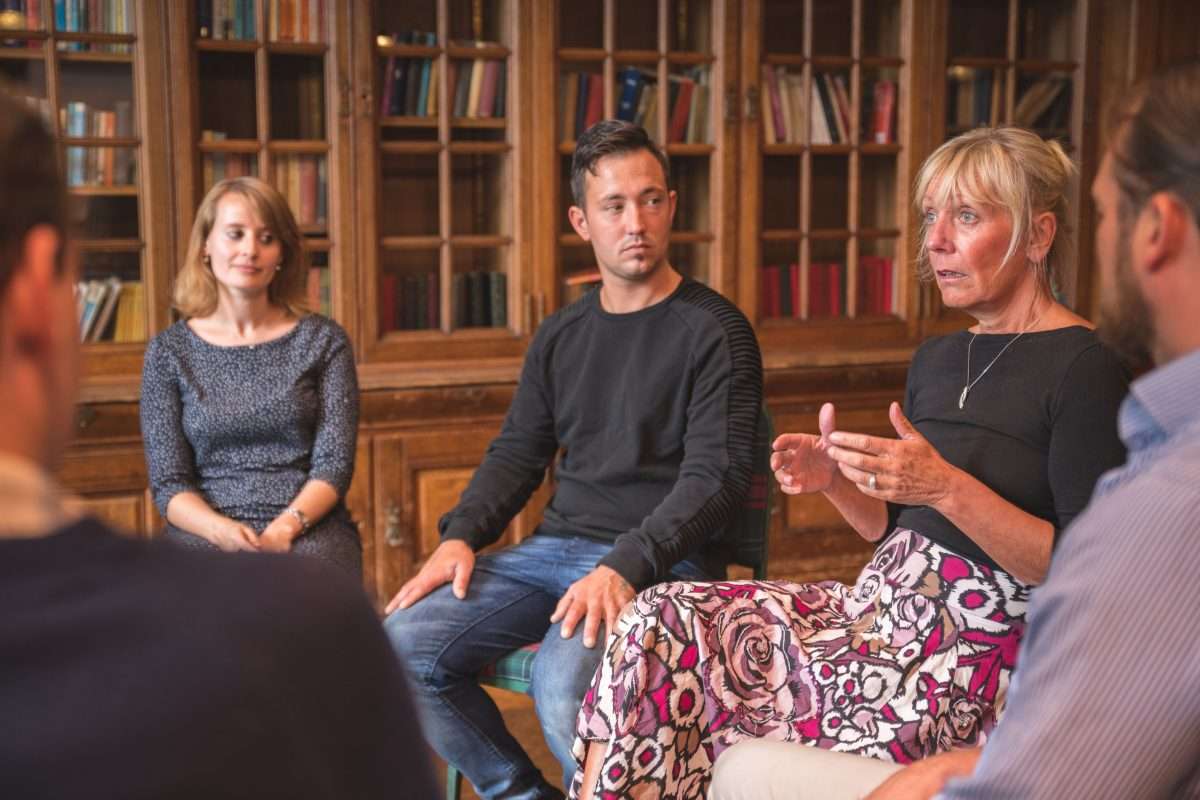
Overcome Alcohol Addiction through Our Rehab
Castle Craig is a leading residential drug and alcohol rehab located in the Scottish Borders serving people from across the UK, including Portsmouth. We provide treatment for alcohol addiction, accessible through private funding, private health insurance, and Portsmouth Hospitals University NHS Trust referrals.
Table of Contents
Castle Craig often admits private patients from Portsmouth into our residential rehab programme and can coordinate transportation to ensure their safe arrival at our facility. Our treatment is accepted by major UK health insurance providers. Individuals under the care of the NHS in Portsmouth can be referred to Castle Craig for inpatient addiction treatment.
We also provide online aftercare counselling that you can access from your home in Portsmouth. Additionally, we offer interventions, either at your home or online, to help individuals address their addiction and seek help. This page will also list various free alcohol and drug treatment services available in Portsmouth.
Alcohol Addiction Statistics in Portsmouth
Alcohol addiction remains a significant issue in Portsmouth, according to data from Public Health England (PHE). In 2020, there were 1,288 hospital admissions due to alcohol-related harm in the city, with men accounting for 63% of these admissions. Furthermore, the rate of alcohol-related deaths in Portsmouth was 15.6 per 100,000, which was higher than the national average. These statistics highlight the importance of continuing efforts to combat alcoholism and support those affected by it.
It is worth noting, however, that progress is being made in reducing alcohol harm in Portsmouth. Since 2016, the rate of alcohol-related deaths in the city has decreased, according to data from the Office for National Statistics (ONS).
Why Come to Castle Craig?
- A Fresh Perspective: Leaving Portsmouth for rehab in Scotland can provide the mental and physical separation needed to truly focus on recovery. It’s about giving yourself or your loved one the chance to reset in a nurturing environment, surrounded by nature and support.
- Comprehensive Care: At Castle Craig, we pride ourselves on our approach to recovery. Our expert team of therapists, medical professionals, and support staff are committed to providing personalised care that addresses not just the addiction but the underlying causes and your overall well-being.
- A Community of Support: Joining our treatment programme means becoming part of a community that understands the journey you’re on. The bonds formed here can become a powerful source of support, both during and after your time at Castle Craig.
- Proven Success: With a history of helping people from Portsmouth and beyond, our evidence-based treatments and commitment to excellence in addiction care mean you’re in capable hands.
Getting to Castle Craig from Portsmouth
By Car:
If you’re travelling by car the approximate distance is around 360 miles, with an estimated travel time of approximately 6 to 7 hours, depending on traffic and road conditions. Despite the distance, the scenic drive to our facility nestled in the tranquil Scottish countryside can be a part of your journey toward recovery.
By Train:
For those preferring public transportation, you can take a train from Portsmouth to Edinburgh. The journey typically takes around 7 to 8 hours, depending on the service chosen. Additionally, we can arrange pick-up from Edinburgh train station, providing added convenience and peace of mind.
We understand that travelling for addiction treatment can feel daunting, especially for those in need of extra support. Our sober transport and sober companion services offer reassurance and companionship throughout the journey, ensuring your safety and comfort every step of the way.
Whether you choose to drive, take the train, or utilise our transportation services, Castle Craig is committed to making your journey to recovery as seamless and stress-free as possible. Contact us today to learn more about our addiction treatment programs and transportation options.
Do I Need Rehab for Alcoholism?
Alcoholism is a disorder defined by an inability to stop drinking alcohol despite unfavourable consequences. It’s a physical and emotional compulsion that can feel overwhelming, giving the person little to no control over their drinking habits.
The major cause of alcoholism is excessive drinking over a lengthy period. The body develops a tolerance to the effects of alcohol as it becomes more acclimated to its presence.
There are certain indicators to be aware of if you are concerned about your own drinking habits or suspect that someone you care about is suffering from alcoholism. Alcoholism’s physical and behavioural symptoms, such as excessive sweating, shaking, isolation, and secrecy, are frequently the most visible.
If you are showing signs of drug or alcohol dependence and withdrawal symptoms, you must seek treatment as soon as possible to avoid the illness from developing. Do not be afraid to ask for help and support.

Download Our Brochure
How to Help Someone With Alcoholism
Private inpatient rehab is widely regarded as the most effective method of alcoholism therapy. Yet, bringing up the subject of addiction with someone you care about may be a difficult and awkward undertaking, especially because most people living with alcoholism are frequently unwilling to accept they have a problem.
If you’re having trouble reaching out to a loved one, arranging an intervention may be a viable choice. You can either sit down as a family or seek the assistance of a professional interventionist to help persuade the individual to accept therapy.
If inpatient or outpatient treatment is not an option for them, you might encourage them to attend 12-step programmes such as Alcoholics Anonymous or Narcotics Anonymous. These support groups can give people a sense of camaraderie, advice, and the tools they need to overcome their addiction.

What Happens at Alcohol Rehab?
Many people are scared of going to alcohol treatment because they don’t know what to anticipate. Our committed staff at Castle Craig strives to build tailored recovery programmes that match each patient’s unique needs, ensuring them feel safe and comfortable throughout their treatment.
- Assessment and Evaluation: Upon arrival, you will undergo a thorough assessment and evaluation by experienced medical and mental health professionals. This assessment helps in understanding the severity of your addiction, and any underlying mental health issues, and crafting a personalised treatment plan.
- Detoxification: If necessary, the first step of your treatment journey will involve detoxification. This process allows your body to rid itself of alcohol toxins under medical supervision. Withdrawal symptoms can be severe and potentially dangerous, but at Castle Craig, you’ll receive the necessary medical care and support to manage these symptoms safely.
- Medical Care: Throughout your stay at Castle Craig, you’ll have access to round-the-clock medical care. This includes monitoring your physical health, managing any withdrawal symptoms, and addressing any medical issues that arise during treatment.
- Therapeutic Interventions: Therapy forms the backbone of alcohol rehab at Castle Craig. You’ll engage in various therapeutic interventions, including individual therapy, group therapy, and family therapy. These sessions provide opportunities to explore the root causes of your addiction, develop coping strategies, and rebuild relationships affected by alcohol misuse.
- Education and Skill Building: Understanding addiction and learning essential coping skills are vital aspects of alcohol rehab. Castle Craig offers educational workshops and skill-building sessions to equip you with the knowledge and tools necessary for long-term recovery. Topics may include relapse prevention, stress management, and healthy lifestyle choices.
- Aftercare Planning: As your time at Castle Craig comes to an end, the focus shifts to preparing for life after rehab. Your case manager will work with you to develop a comprehensive aftercare plan tailored to your needs. This may involve ongoing therapy, support group participation, sober living arrangements, and connections to community resources.
- Continued Support: Recovery is an ongoing journey, and Castle Craig is committed to providing continued support even after you leave us. You’ll have access to our alumni programme, Recovery Club and resources to help you stay on track and navigate the challenges of maintaining sobriety in the long term.
Therapy for Alcoholism
Detoxification is a crucial first step in addiction treatment, helping the body withstand the process. However, recovery from addiction involves more than just detox. Our psychological treatment techniques play a pivotal role in helping patients identify and develop effective coping mechanisms. These therapies are essential for recovery, equipping patients with the necessary tools and support to navigate their journey towards sobriety.
Some of the therapies we offer include:
- Family Therapy and Family Workshops
- Sleep hygiene techniques
- Grief Therapy
- Detoxification
- Full psychological assessment
- Trauma therapy
Alcohol Detox
Both mentally and physically, the detoxification process can be hard, so it is important to be in a safe, peaceful, and supportive environment during this time. At Castle Craig, we offer a specialised medical detoxification centre that allows you to focus on your physical recovery while also preparing you to begin your psychological journey towards addiction recovery.
The detoxification process normally lasts 7–10 days; however, this might vary based on a variety of circumstances, including the frequency and quantity of alcohol consumed.
Medications are typically prescribed during detox to ease the symptoms of withdrawal.
Some of the most commonly prescribed medications include:
- Chlordiazepoxide (Librium)
- Valium (Diazepam)
- Clonazepam (Klonopin)
- Lorazepam (Ativan)
Inpatient vs Outpatient Alcohol Rehab
When it comes to drug and alcohol rehab, there are two basic treatment options: residential rehab and outpatient rehab.
Residential rehab, often known as inpatient rehab, requires you to stay at the facility until your treatment programme is completed. With outpatient care, you can schedule therapy sessions around your daily life.
| Benefits of Inpatient Alcohol Addiction Treatment | Cons of Inpatient Alcohol Addiction Treatment |
|---|---|
| The main benefit of choosing inpatient treatment is that you will have access to ongoing care and support throughout your stay. This is especially useful during alcohol withdrawal, which can be a difficult procedure. You may also receive prescription medications to relieve withdrawal symptoms, as well as the assurance that a doctor will be present around the clock if you require further medical support. | We understand that the cost of inpatient treatment can be prohibitive for some people seeking private rehab. However, many clinics provide numerous financing options, such as payment plans or government support, to help make treatment more accessible. |
| Benefits of Outpatient Alcohol Rehab | Cons of Outpatient Alcohol Rehab |
|---|---|
| Outpatient rehabilitation may be a more convenient choice for people who have work or childcare responsibilities. It is also less expensive than inpatient therapy. Outpatient treatment can allow you to put the new tools and abilities you’ve learned in therapy to use in real-world settings. | Outpatient addiction therapy is a popular option for people who want to maintain their independence while receiving addiction treatment. One of the most serious concerns, however, is the possibility of being exposed to outside stimuli, which could lead to a relapse. Outpatient rehab, unlike inpatient rehab, does not provide 24-hour medical support, and detox is not covered. |












Free Alcohol Help Services In Portsmouth
The Portsmouth Recovery Hub offers drug and alcohol support services such as substitute prescribing, relapse prevention, psychosocial services, detoxification, rehabilitation, and harm reduction. The hub is open from 9 a.m. to 5 p.m., Monday through Friday, and serves the Portsmouth area. Referrals can be made either directly or through other agencies.
The Portsmouth Wellbeing Service provides free assistance to people who want to quit smoking, drink less alcohol, eat healthier, and move more. The service is available in a variety of locations throughout Portsmouth and can be accessed directly or through a GP referral. The service is available from 9 a.m. to 5 p.m, Monday through Friday.
Hope House is a service that provides a safe place for homeless people in the Portsmouth area to sleep, shower, and eat. They provide practical assistance and support to single homeless people suffering from alcohol, drug, and mental health issues. Single homeless people with dogs can also use the service.
Other help can be found online:
- Alcohol Change UK
- Drink aware
- Talk to Frank and NHS Choices
- NHS Live Well
- Online blood-alcohol calculator.
FAQs
How Much Does Alcohol Rehab Cost?
The cost of drug and alcohol treatment can range from £2,000 to £5,000 per week, depending on the type of rehab and whether it is residential or outpatient. The cost will also vary depending on your location, duration of stay, and treatment plan.
How Long Does Alcohol Rehab Take?
We recommend a minimum of five weeks for patients to thoroughly detox and benefit from the different addiction therapies we provide.
Does Alcohol Rehab Work?
Addiction counselling works if you put forth the effort. Even though the therapies provided at residential rehab are designed to help you maintain your sobriety long after you leave, it is up to you to continue the effort once you are discharged.
Is Alcohol Rehab Covered by Insurance?
Several insurance companies provide treatment for conditions including alcoholism, drug addiction, and other mental diseases. To find out if private rehabilitation is covered by your policy, check with your provider.
How to Get Someone Into Alcohol Rehab?
We recognise that asking for help might be scary when you don’t know what to expect. That is why we are here to listen to you and help you or a loved one get started on the road to recovery. Our team is here to guide you through the inquiry and admissions process from the moment you to the moment you walk through our doors. Contact us right now at 01721 546 263 to speak with a member of our admissions team.
Experts You Can Trust
With a wealth of knowledge and services to help you regain control of your life, request a call-back from one of our professionals today. The choice you make today could change your life forever.